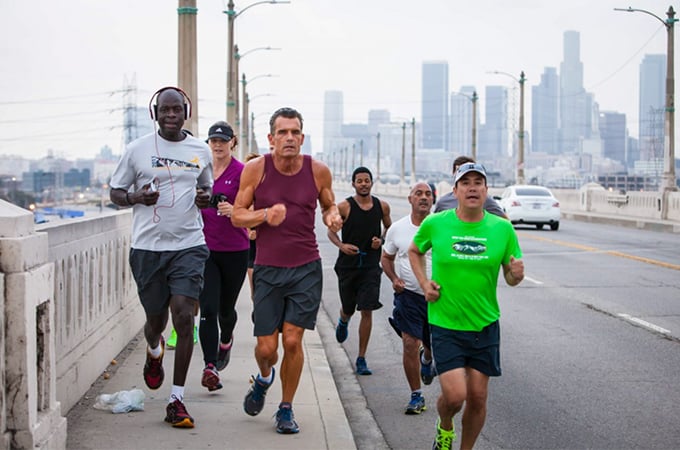Watching Skid Row Marathon, numbers take on importance, as individuals talk about the age they were introduced to drugs or alcohol, length of their addiction, durations of homelessness, numbers of arrests or fines accrued, initial sentencing to incarceration, and time spent—often down to the day—inside and outside prison walls.
As the documentary film progresses, different numbers arise: a 5:30 a.m. wake-up call, how many people show up to run around Downtown Los Angeles, routes with mileage that reaches into double digits, and the amount of money needed for more than 20 people to travel to Italy to compete in an international marathon.
Such is the story of the Skid Row Running Club, an organization with a mission to support people overcoming substance abuse and homelessness. Recently, the filmmakers hosted a screening of the documentary followed by a discussion at the University of Redlands. The event was funded by the Associated Students of University of Redlands and cosponsored by U of R’s School of Education Office of Student Success, Department of Race and Ethnic Studies, R.E.A.C.H. (Read, Empower, Attain, Create, Hope), and Office of Community Service Learning.
“The film shows us the power that a caring community can have in transforming the lives of people who are in recovery and seeking redemption,” says Professor Brian Charest, who occasionally runs with the group. “So many of us know someone who struggles with addiction, or who has been incarcerated, or has mental health issues, or we've faced these struggles ourselves. We all know that the road to recovery is a tough one, but we also know that with the support of a community, you can get better, you can heal, and you can come back into the world and live a different life. The message of the club is that you're not alone. If you want to change, we can help.”
Los Angeles Superior Court Judge Craig Mitchell started the Skid Row Running Club when he was asked to expand programming for a homeless shelter on Skid Row called The Midnight Mission. Over the last decade, the number of participants in the running club grew and so have their opportunities—in January, Mitchell will travel to Egypt with 55 runners to participate in another marathon.
The documentary, which was released in 2017 and took four and a half years to make, explores the relationships Mitchell has built with the club’s participants, some of whom are ex-offenders he had sentenced to prison.
“Sentencing people regularly to life sentences, you’d have to be less than human not to be weighed down by the reality of what you’re doing, what you’re committing another human being to,” Mitchell says early in the film.
While he advocates for reasonable criminal sentences commensurate to the crime committed, Mitchell knows there is often a large disparity between a conviction and the length of incarceration that results. In a sense, the running club is a form of restorative justice, where people who were formerly incarcerated can revive a sense of dignity in their lives.
Central to the film are David Askew, Ben Shirley, and Rafael Cabrera, three of the club’s early and most dedicated members. Mitchell raised funds for them to travel to Ghana, where Askew and Shirley completed their first marathons. Unfortunately, Cabrera, who was convicted of first-degree murder in a gang-related shooting, was subject to parole conditions that prevented him from being able to travel. However, he was eventually able to travel to Rome, in the company of 24 running club members, to participate in the Maratona di Roma.
Following the screening, Producer Gabriele Hayes, Mitchell, and Cabrera spoke about their experiences, emphasizing the reciprocal nature of the support that exists among members of the running club. When Mitchell had a brain tumor removed in February, he had a rotating cast of volunteers who drove him from his home in Pasadena to his office downtown each day for work. Cabrera, who was released from prison 10 years ago, now works for the City of Los Angeles and buys race bibs for Mitchell and other members to compete in the Pasadena Half Marathon each year.
Mitchell is the first to acknowledge that a friendship between a superior court judge and a man convicted of first-degree murder is unique in many ways. But Mitchell also knows that Cabrera’s crime is a small part of who is he is.
“Everybody has a backstory,” said Mitchell. “It’s important to take the time to learn that backstory. All of us understand that fundamental need—to be cared for, to be loved. Running is secondary.”
Learn more about the School of Education or the College of Arts and Sciences.






